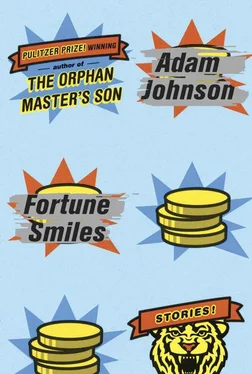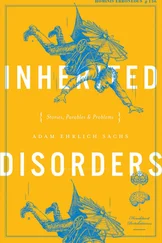“Ah, a celebrity defector in the making,” DJ said.
They’d seen such defectors on ROK TV. Usually, they were beautiful young women who wept as they told the most harrowing stories — of starvation, separation, suffering and torture. Always a baby died. Always there was the moment when the dark shadow of rape fell across the story, and the interviewer let the silence linger before shifting to the desperate escape. All the average defectors, they weren’t news. And never on TV was there a story of a man who escaped North Korea in a black Mercedes sedan with a driver who must sit on a briefcase filled with counterfeit lottery tickets in order to see over the wheel.
DJ asked, “Do these ladies drink white wine while you tell them about freezing winters and endless peril?”
“The winters were freezing.”
“We had a propane heater.”
“There was peril. People were shot. People disappeared.”
“We paid protection money,” DJ said. “You haven’t told those ladies about the things we did in Chongjin, have you?”
“Of course not,” Sun-ho said.
He licked the last streaks of sauce from his fingers and wadded up the wrapper.
“The famine was real.”
DJ nodded. “The famine was real.”
Sun-ho smiled. “Look,” he said, “you’re only going to meet hobos and crazies going to meetings in Gwanak. Come to Gangnam — all the ladies there are genuine do-gooders. They have absent husbands. Their kids have shipped off to Stanford. These are ladies with time on their hands, and trust me, they take care of themselves.”
Sun-ho caught the teens in school uniform sneaking wary glances their way.
“What?” he called to their booth. “What the fuck are you looking at?”
The students feigned interest in their fries.
Sun-ho turned back to DJ. “When I was their age, I didn’t sit around giving people stupid looks. When I was sixteen, life was hammer and sickle.”
It was true. While DJ’s path had been smoothly laid out for him, Sun-ho’s had been one long scramble. DJ looked at the kids. Growing up in Pyongyang, he’d worn a school uniform, too, complete with a red scarf. Images of kids in uniform were everywhere recently. A ferry filled with such students had sunk, and DJ was newly aware of these uniformed kids drifting down the streets, huddling in the subway cars, killing time in fast-food booths. There was something ghostlike about them, the boys in their green-and-white ties, the girls with their slate-white scarves, their blazers the color of the cold, cold ocean. As the ferry slowly sank, the students were told to wait in their cabins, and there they passed the time until the ferry rolled under the waves.
“I almost forgot,” Sun-ho said. “I brought gifts of good fortune.”
He produced a handful of lottery tickets.
DJ took one. It was an instant ticket named Triple Jewel.
“What’re you doing with these?” he asked.
Sun-ho shrugged. “I cash my government checks at a liquor store. On a whim, I bought some. I thought, why not try our luck with the Korean lottery?”
DJ held the card to the light. This was no cheap Chinese scratch-off. This was no forged Pai Gow Poker card that you printed off ten thousand at a run. This wasn’t even Fortune Smiles, which was the finest lottery ticket they’d ever counterfeited.
“Look at this one,” Sun-ho said. “This ticket’s called 520. You win a pension from the Korean government. It pays out five million won a year for twenty years.”
DJ retrieved his reading glasses, which the ophthalmologist at Hanawon had given him. He examined the 520 card. It was multi-layer, with dual win zones, holographic foil, confusion patterns and self-voiding strips. Looking closer, he saw micro-printing and perforation work. This was made on a very sophisticated machine, probably a series of machines, not the old Japanese press they’d managed to modify and keep running.
“Don’t look so serious,” Sun-ho said. “Scratch a few.”
DJ watched Sun-ho use a car key to play a card, vigorously scraping away the grey vinyl topcoating. DJ recognized the mad energy in Sun-ho’s eyes. In North Korea, crime was state-sanctioned; crime was an absolute necessity. If you dined at all, you dined on illegality. Here in Seoul, crime was a much different matter.
“Wait a minute,” DJ said. “What are you doing with a car key?”
Sun-ho handed it over. It was a Toyota dealer’s key, stamped for the year 2000. It would open and start any Toyota from that year.
“Where’d you get this?” DJ asked.
“I brought it with me,” Sun-ho said. “I brought all our keys.”
How, in the sudden mad scramble of their escape, had Sun-ho thought to bring the master keys? DJ handed it back. “Get rid of it,” he said. “We don’t have hard currency quotas to meet anymore. Those days are gone. And you don’t need a 520 pension. We get deposits from the government now.”
Sun-ho came around to the other side of the booth so the two men were shoulder to shoulder. Here he turned his wide, bulging eyes to DJ. The doctors at Hanawon said Sun-ho’s eyes were the sign of a condition, a condition that had a name, but Sun-ho didn’t want to know it. Most people were frightened of these eyes, but as DJ looked into them, he thought only that they were vulnerable and revealing.
“So I play the lottery,” Sun-ho said. “So I’m friendly with a few Gangnam moms. So I borrow cars.”
“You’re borrowing cars?”
Sun-ho ignored this. “I’m trying to make the best of the situation we’re in,” he said. “I didn’t choose to defect, if you’ll remember.”
DJ cast his eyes down. “I don’t forget,” he said.
“Good,” Sun-ho said, and clapped DJ once on the back.
There was no word in the South for their relationship. Sun-ho was perhaps fifteen years older than DJ, yet he was more than an uncle. The term comrades no longer applied, though it never really captured the way they had each sacrificed to keep the other going. Even though Sun-ho called him sajang and, jokingly, big boseu, DJ had never acted like a boss. And there had never been an employee as cunning and steely-eyed as Sun-ho. Sun-ho was an assistant, a driver, a partner, an enforcer, a friend. Maybe there wasn’t a name for their relationship in the North, either, but there they didn’t need one.
“Besides, I’m not the one you should be worried about,” Sun-ho said. “I only lost a country. But you, you’re losing more than that. I guess you’re worried you’ll never fit in here. If you ask me, DJ, you’re starting to fit in too well.”
How to explain to Sun-ho that living in Seoul was bringing into focus not the South but the life he’d lived in the North? Where was the lottery ticket whose prize took the blood from your hands?
They heard a noise. It was the electronic-shutter sound of a cell phone taking a picture. They turned to look at the teens, who sat innocently, sipping their sodas.
Sun-ho rose and limped toward their booth.
“Let’s just get out of here,” DJ called after him.
“You want a picture of a North Korean?” Sun-ho asked them.
None looked up, though one girl let a nervous laugh escape.
“Here I am,” he said. “Go ahead and take it. Take a Chosunin photo for your Internet pages.”
“Come on,” DJ said. “Let it go.”
Sun-ho didn’t let it go. He leaned in close and produced a maniacal, exaggerated smile. “I’m ready for my photograph,” he said. “I’m smiling, I’m saying kimchi .”
The students sat frozen.
“That’s what I thought,” Sun-ho said. “You are all passengers. And this whole fucked-up country is the ferry. You call us robots. You call us order-taking zombies. But we know what adversity is. We know what it is to survive, and I can tell you — not a single one of us would have drowned on that boat.”
Читать дальше












